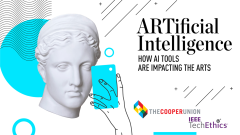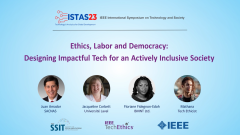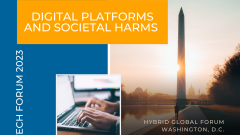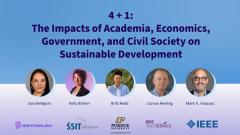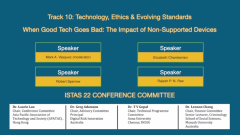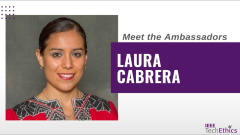Shaping the Future Workforce: Transformative Impacts of Emerging Technologies | IEEE TechEthics Public Forum
About the Video: Reports indicate that autonomous technologies will increasingly replace functions currently filled by paid workers. This public forum addresses current and future impacts of these transformative technologies on the workforce.
About the Speakers:
Professor Birgitte Andersen (PhD Economics) is CEO of Big Innovation Centre, a London based think-tank and innovation hub that promotes open innovation via challenge-led taskforces, All Party groups in UK Parliament on Artificial Intelligence and Blockchain, and an AI Global Governance Commission. Since 2011, she has rapidly -- through a strong vision -- directed and grown the Big Innovation Centre to become a building block in the innovation landscape in the UK and European Union. She is now accelerating the Big Innovation Centre vision with thought leaders, innovative companies and ‘what works’ innovators in the Middle East. Being an entrepreneur and international expert in business model innovation, Intellectual Property governance and the weightless and ‘smart’ knowledge economy, she is called in by the media (e.g. BBC, Al Jazeera, SKY), and her work is published in renowned journals, and highlighted in government reports. During the internet boom, Birgitte launched and ran (2000-2010) probably UK’s biggest interdisciplinary postgraduate programmes on E-Commerce at University of London (Birkbeck), where she still holds the title Professor of Economics and Management of Innovation. She advises economists and policy makers of national governments in and beyond Europe including OECD, UN and WIPO; and large firms, and serves as an expert defence witness in the UK courts on matters of IP use on the Internet. She was the Rapporteur for the EU Commission representing the EU Expert Group on Knowledge Transfer and Open Innovation, and currently sits on the EU Expert Advisory Panel for Horizon 2020 - Societal Challenge: Europe in a Changing World – Inclusive, Innovative and Reflective Societies. Birgitte was recently (October 2018) appointed on Arab League Expert Group on Digital Transformation regarding the Digital Economy Strategy for the Arab World.
Joanna Bryson is a globally-recognised leader in both artificial intelligence itself and AI ethics. With two degrees each in psychology and AI (BA Chicago, MSc & MPhil Edinburgh, PhD MIT) her original focus was the use of artificial intelligence for scientific simulations of natural cognitive systems. During her PhD she first observed the confusion generated by anthropomorphised AI, leading to her first AI ethics publication “Just Another Artifact” in 1998. In 2010 her work in AI ethics was first recognised by a policy body when she was invited to participate in the EPSRC/AHRC Robot Ethics retreat, where she was a key author of the EPSRC/AHRC “Principles of Robotics”, the world’s first national-level AI ethics soft policy. Since then she has continued researching the impact of technology on economies and human cooperation, transparency for AI systems, and participated in numerous policy opportunities for the UK (parliament, royal society, RCUK, FCA), EU/EP/EC, OECD, Red Cross, Chatham House, WEF, as well as national government and NGOs in Switzerland, the US, Canada, and Germany. She came to Bath in 2002 where she founded the Computer Science Department’s Artificial Intelligence research group, and she was made Reader in 2010.
Michael Chui is a Partner in the McKinsey Global Institute. He is based in San Francisco, CA, where he directs research on the impact of disruptive technologies, such as data & analytics, social & collaboration technologies, the Internet of Things, and artificial intelligence, robotics & automation, on business and the economy. As a McKinsey consultant, Michael served clients in the high-tech, media, and telecom industries on multiple topics. Michael is a frequent speaker at major global conferences and his research has been cited in leading publications around the world. Michael holds a B.S. in Symbolic Systems from Stanford University and earned a Ph.D. in Computer Science and Cognitive Science, and a M.S. in Computer Science, from Indiana University. Prior to joining McKinsey, Michael served as the first Chief Information Officer of the City of Bloomington, Indiana, and was the founder and executive director of HoosierNet, a regional Internet service provider.
Vinicius Pinheiro is the Special Representative to the UN and Director of the ILO Office for the United Nations, based in New York. He is the leading ILO official responsible for issues related to the world of work at the UN. His portfolio includes the areas of employment and decent work, social protection, labour migration, youth employment, child and forced labour, women economic empowerment, labour rights and the future of work. Mr. Pinheiro was the ILO lead negotiator in the UN deliberations on the post 2015 development agenda and Sustainable Development Goals (SDGs) that led to adoption of the Agenda 2030 for Sustainable Development. He was instrumental in advancing Decent Work in the SDGs and in particular in shaping the SDG 8 on Decent Work and Inclusive Growth. Before moving to New York, Mr. Pinheiro worked as part of the ILO G20 Sherpa Team and was executive secretary of the Social Protection Floor Advisory Group, headed by Ms. Michele Bachelet, which led to the adoption of the ILO recommendation on social protection floors. Prior to joining the ILO, Mr Pinheiro was National Secretary for Social Security of Brazil and Vice Minister for Social Security (1999–2002) responsible for the design and implementation of Brazilian pension reform, including measures to increase coverage and strengthen the social protection system. Mr. Pinheiro is an Economist and Political Scientist and was trained in a number of advanced execute courses on Pensions Schemes (Harvard International Institute for Development, Cambridge); Leadership in the Public Sector (Harvard Kennedy School of Government, Cambridge) and Global Management and Leadership programmes (University of Chicago Booth School of Business and Instituto the Empresa - IE).
Mark A. Vasquez (moderator) is a Certified Association Executive (CAE) with over 25 years of experience in association management at IEEE. He currently serves as the program manager for IEEE TechEthics (techethics.ieee.org), a program that drives conversations about the ethical and societal impacts of technology. In this capacity, he works to develop relationships with others in the technology ethics community, produces events, convenes thought leaders, and more. Mark is an engineering graduate of The Cooper Union.
Recorded on 28 February 2019 at The Cooper Union (NYC) as part of the IEEE TechEthics Conversations Series. This session was made possible in part by a grant from the IEEE Foundation.
About the Video: Reports indicate that autonomous technologies will increasingly replace functions currently filled by paid workers. This public forum addresses current and future impacts of these transformative technologies on the workforce.
About the Speakers:
Professor Birgitte ...
 Cart
Cart Create Account
Create Account Sign In
Sign In
